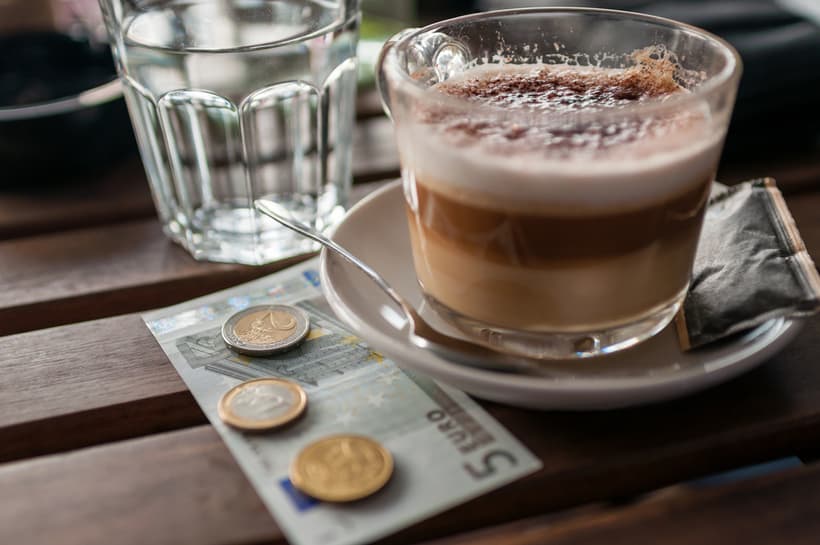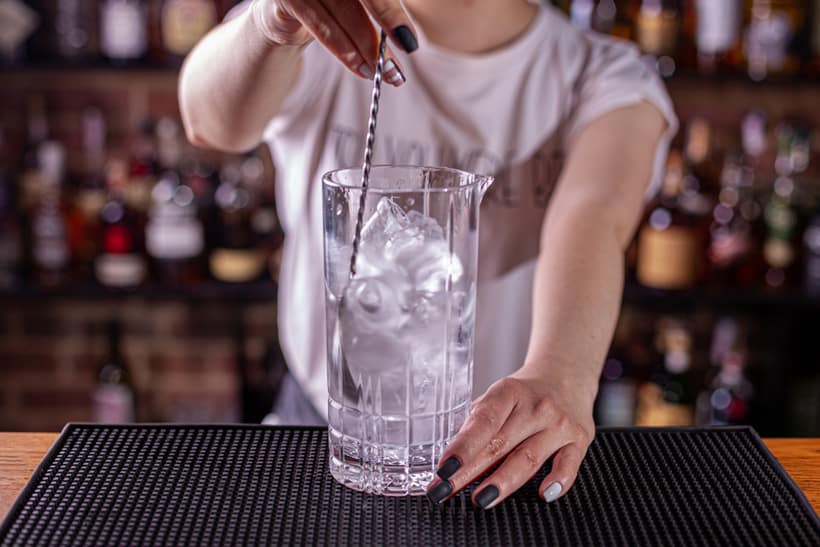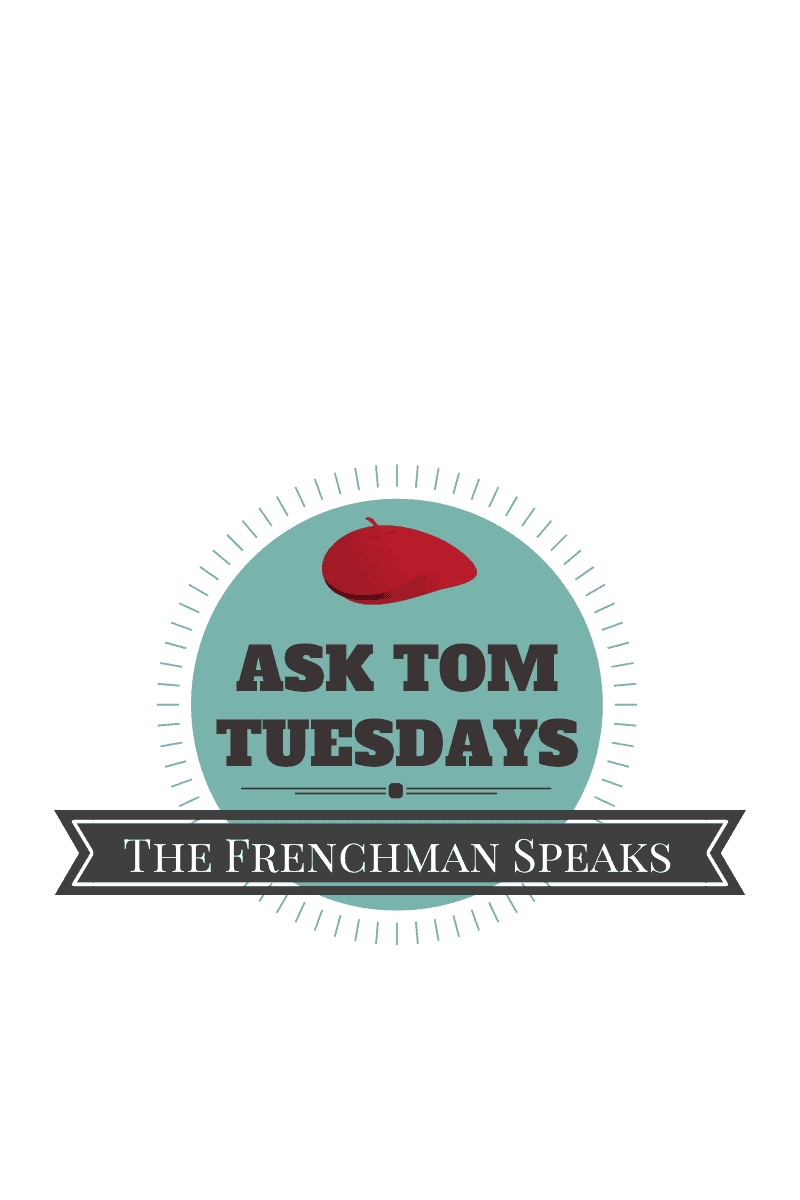If you live in one country for most of your life well into your 20s and then move abroad, it’s only normal that some of the habits, mindsets, routines, and ways of life from your formative years will move with you. Some aspects of your life will completely change, others will start to adapt little by little, and some will remain the same. It’s the ones that remain the same that can lead to some weird looks and questions, so let’s talk about them. Here are some of the American things I do that confuse French people.
Given the current situation in the world right now, I thought I’d share a lighthearted post with you. If you want something deeper, I shared some living abroad reflections after 8 years in France. And if more light and fun is what you’re after, I recently wrote this list of 77 little differences about life in France.
So first up, I hate having to even write this sort of disclaimer, but people get crazy. And crazy defensive. Let me say right out of the gate that what follows is just my experience and not indicative of every American. The USA is a huge country and we’re not all the same — thank goodness for that.
One way of doing things isn’t better or worse, smarter or dumber. Different cultures are, well, different. Do what’s best for you and where you live and learn along the way. 😉
Let’s get into my list of American things I do that confuse French people…. or make them think I’m nuts, a little odd, or at the very least open up a dialogue about our respective cultures.
American things I do that confuse French people
1. Washing chicken before cooking it
Let me start off by saying I stopped rinsing my raw chicken breasts a long time ago, but if you ask Americans if they wash their chicken before cooking it, I bet a few will say yes. Julia Child actually believed in washing chicken and food experts debate whether or not it’s the right thing to do. You don’t have to look far on the internet to see that Americans washing chicken is a thing.
Since moving to France, I no longer wash my chicken because I learned it can spread bacteria around the kitchen and simply cooking it properly will kill any lingering bacteria. When I first moved here, I did wash my chicken and my father-in-law looked at me like I was nuts (normal occurrence). I know better now.

Photo credit: Shutterstock.com/Africa Studio (and feature image)
2. Eating quickly and/or eating while multitasking
I eat fast and always have. I don’t know why I rush, but it drives my husband Tom nuts and is a bad habit I’m trying to break. For most of my life, mealtime would be an afterthought or just an obligatory step in my day before getting back to work, running out the door, etc.
Eating fast and not focusing on the food is a habit I’ve earnestly gotten better at since moving to France. I’ve learned little by little to appreciate the meal for what it is — a time to slow down, take a real break, connect with family and friends, and enjoy the food. It’s not the time to look at a screen, talk on the phone, or anything else that doesn’t keep you in the moment.
3. Refrigerating eggs
As soon as I get home from the grocery store, my eggs go right into the fridge. It’s a habit. In the USA, all commercially produced eggs need to be refrigerated to prevent condensation from forming on the shell. Moisture allows bacteria to get into the egg and makes us sick.
In France, the eggs retain the protective coating that prevents this from happening due to the way they’re processed. French people do sometimes refrigerate their eggs but not out of necessity like we do in the USA. They’ll refrigerate them to extend the shelf life or to free up counter space.
4. Walking around with bare or sock-covered feet
I’ve become a slipper convert, but for the first couple of years in France, I’d frequently walk around my house with my socks on (or bare feet in the summer) — no slippers. You see, wearing slippers is the norm in France, or at least in my experience. You don’t need fancy ones, but house slippers are certainly more common here. Maybe it’s just my husband’s family, but if feet don’t have slippers on them, they assume you’re cold or just weird.
Quirks I notice about my French husband >>
5. Switching between tu and vous with the same person
In French, there’s a formal and familiar way of saying the word “you” and which one you use depends on a lot of factors I won’t rehash here (read this instead). The French seem to have this superpower of remembering who they address as tu and who they address as vous. But I don’t.
Yes, in some cases it’s very clear. That’s not what I’m talking about here. I’m referring to instances where maybe an older person has agreed that you can use the tu form and you oblige and then start off with vous the next time you see them a year later because by default you address an older person with the vous form and didn’t remember they asked to tutoyer.
We’re forgiven as foreigners but it’s happened to me a bunch where I’ve used vous with someone I don’t know well who I used tu with the last time we spoke. I guess it’s better than the reverse — to use the informal tu by accident when you should say vous — but still.
6. Cutting my food into pieces
Because Americans generally switch what hand their fork is in to cut their meat and then eat it, it was only normal for me to continue on like this in France. I’d cut my meat into a few pieces with my fork in my left hand, then switch my fork back to my right hand to eat the meat.
In France and many countries around the world, the fork stays in the left hand to cut and then eat the one piece you’ve cut. There’s no cutting several pieces and then switching the fork back to the right hand to eat them. I’d say I now do it the French way at least half the time.
The first time I met my now brother-in-law, he asked me if I was cutting my steak for a child when he saw multiple bite-size pieces on my plate. I said nope, just me, as he watched me do my utensil dance for the rest of the meal.
7. Making small talk
In many regions of the USA, it’s perfectly normal and polite to make small talk with strangers if you’re waiting in line, in a waiting room, or anywhere really. I’ve complimented strangers on their shoes, asked people questions, and struck up conversation just because. In France, social norms are a bit different, and while making small talk with complete strangers isn’t rude per se, it might be seen as unusual.
This is because respecting one’s personal life is super important and the public vs. private spheres have boundaries. If a French person isn’t super receptive to your small talk, it doesn’t mean they’re being rude, cold, or that they don’t like you. They’re respecting social boundaries. Tom wrote more about his social difference that took me a while to grasp in this post.
I wrote more about small talk in France here with all the nuances to be aware of, so check it out!

Photo credit: Shutterstock.com/mastermilmar
8. Tipping
When I first arrived in France, I’d tip my hair stylist out of habit but quickly learned it’s certainly NOT the norm to leave 20% at a restaurant, hair salon, spa, and other places you’d generally tip in the USA. French people do leave tips but it’s not on the same scale. I wrote more about tipping in France here.
9. Having wine before the meal
Or while reading, watching TV, etc. In France, wine complements the food. While some people probably pour a glass of wine to unwind, cook, or pre-game like I do, the vast majority of French people won’t pop a bottle to drink before the food is on the table or to drink on its own while reading a book or taking a bubble bath, or just because you feel like it.
To further clarify, I’m not saying that French people don’t ever drink alcohol before a meal. They do happy hour and apéro is crazy popular. The difference I’m pointing out is that in the U.S., it’s more common to open a bottle of wine to complement another activity whereas in France, wine is something to go with the food more often than not.
Tips for visiting a French winery to get the most out of your visit >>
10. Using dental floss daily
Even if you have near-perfect teeth in the USA, your dentist will still find something to gently scold you about. No? just me? I’m only half serious, but really, in full seriousness, flossing daily is a completely normal thing to do in the USA if you have good dental hygiene and there are all kinds from which to choose. Do all Americans do it daily? No, of course not, but dentists will advise you to do so.
Kids in the U.S. grow up knowing about floss and it’s a normal part of dental hygiene just like brushing your teeth.
Here in France, my dentist told me flossing is too harsh for the gums and teeth and if anything, use a little interdental twisty brush instead.
——>> Fave floss: For those of you in the U.S., Cocofloss is the best floss I’ve ever tried. It’s a premium product that comes in delicious flavors. Get $10 off here!
11. Eating dinner on the early side
I’ve majorly relaxed my timing on this one over the years and I’m OK with it as long as we’re at the table by 8 p.m. After 8 p.m. feels late to me. I go to bed early. What can I say? In a perfect world, dinnertime would be 7:30 p.m. for me but that rarely happens. Tom looks at me like I’m nuts if I start cooking at 6:30 or 7 p.m. and we’ve gotten into actual arguments about dinnertime, so I just do it the French way as much as I can.
A normal dinnertime in the U.S. would be 6 or 7 p.m. If you’re in a big city and are child-free and work late, maybe an 8 or 9 p.m. dinner reservation (on Friday or Saturday) would be normal. In suburbia, especially American families with young kids, most families have dinner on the table by 7 p.m. and even earlier in the winter. In France, I’d say 8 p.m. is the norm. Saying this took some getting used to would be an understatement.
12. Making pumpkin pie or any dessert with pumpkin
Pumpkin pie is my favorite dessert and when I’ve made it around the holidays, French people are alway a little perplexed. Curious, though, which is a good thing. And then they end up loving it. The raised eyebrows come from the fact that pumpkin is a vegetable dish here and not something you mix with spices and sugar for dessert.
Get my favorite Eiffel Tower spatula >>

Photo credit: Shutterstock.com/JPliatsushok
13. Put ice cubes in my drinks
I like my beverages cold. Especially anything carbonated. Unless you ask (and then sometimes you still get only two ice cubes), if you get a soda at a drive-through window, it’s without ice. It just doesn’t taste the same without ice! Also, you don’t really find big bags of ice for BBQ coolers for sale at the supermarket like you’d find in the USA.
14. Buying an air conditioner
Central air conditioning is not the norm in French homes and even if summers get hot in many regions, people just deal with it. They shut their volets and use fans. Although it took me nearly seven years to do it, I finally caved last summer and bought a portable a/c unit for our bedroom. I only like to sweat when I’m working out. Not when I’m just calmly sitting on my couch. Or trying to sleep. Or getting dressed for work.
Why are the French afraid of air conditioning? >>
15. Praying before a meal
Saying grace is not a thing in France except for very religious families. I can’t say I’ve encountered it once. I am not religious and don’t say a prayer before dinner but growing up, a lot of friends and family members did this in the USA and it was normal. Not so much in France where it might seem strange.
16. Smiling at strangers
Americans overall are warm people and it’s normal, depending on where we’re from, to smile at others. It’s not an invitation to hit on us. It doesn’t mean we’re crazy or want anything from you. We’re just being friendly. I’m not overly smiley but I am friendly and happy to chat. It’s just a little different in France. People keep to themselves more and don’t typically smile at strangers unless there’s a reason.
17. Writing the date mm/dd/yyyy
If I’m not paying attention, I’ll sometimes mess up the date. So today is April 11, 2020 and I’ll write 4/11/2020 on forms out of habit. In France, the date is written dd/mm/yyyy, so it’s 11/04/2020 but it’s easy to revert back to the way I wrote the date the first 26 years of my life. It’s kind of like writing 2019 the entire month of January out of habit even though it’s 2020.
P.S. The reason why dates start with the day first and then the month is because we say it’s le 11 avril and not April 11.
***
What about you? What things about your native culture have gotten you some strange looks abroad? Would love to hear in the comments!
PIN IT:

Photo credit: Shutterstock.com/belushi





Yep – spot on! You’ll have to check out
-https://suzlearnsfrench.blog/2017/07/08/july-8-2017-lost-in-translation-juste-a-typical-afternoon-avec-ma-belle-mere-en-france/.
Hope all is well mon amie.
Always enjoy these, Diane! Thanks! Q
Firstly, I want to stress that the following is based only on my own personal experience and is in no way representative of the whole dordle American public. Thank god we’re not all the same throughout the United States’ vast territory. There is no such thing as a “right,” “wrong,” “clever,” or “stupid” manner of accomplishing anything.
I do many of these things not the date thing we do day/month/year
Haha yes being married to an Australian enlightened me on a few differences between America and the rest of the world… particularly when I saw eggs in the grocery store sold on regular shelves and not in the refrigerated area! Of course now I raise chickens and ducks and never refrigerate our eggs unless I want to boil them (then refrigerate for a week or two so the shells peel off easier).
Funny, my husband having been in the States for 6 years now means he’s writing the date “our” way now
That being said, in reading your post we realize we have more similarities than differences. Growing up in Oregon we never had AC, I’ve never cut my food into pieces first, and I can’t comprehend why someone would wash their chicken before cooking it.
With exception of the small talk thing (and the amount of feces we saw on the streets of Paris during our last trip), we’ve loved our times in France and can’t wait to return when restrictions are lifted.
PS coronavirus is what led us to finding your awesome videos on YouTube (I hate most Netflix offerings and we’ve fallen down the rabbit hole with food & travel videos !). Woo hoo!
Hi Aimee, thanks for coming over from YouTube. So happy you found my channel! Cultural differences are fun, aren’t they? Does your husband get asked if he’s British pretty much daily? I’m pretty good now at picking up an Australian accent now but I feel like a lot of people in the USA are more familiar with the British sound and get a little confused when they hear an Aussie and assume the person is British.
Anyway, take care in quarantine and thx again for leaving a comment!
Great post – interesting observations 🙂 In terms of the date format, I’m afraid the whole of Europe, if not the majority of the world, write it in dd/mm/yy. I believe the States is the only place, or one of the couple of places along with Canada, on this planet that writes it in the reverse format. And it comes from computer people putting smaller byte size items are put first. So please don’t be surprised if you go to Slovaka, Brazil or Australia, and again you’ll see the date format in the non-American way 🙂
Great list! When I’m eating with a European, I certainly try my darndest to hold my cutlery the “right” way and not switch, but when I’m at home, I can barely be bothered to use a knife. I’m not ashamed to say that our American dining habits can be super lazy… but sometimes it suits 😉
Thanks for reading, Cynthia. About the habits, whatever works, right? Hope you’re doing OK!
Yeah, I don’t care what the French dentists say, I am NOT going to stop flossing. I feel quite certain it is one of the reasons my teeth are in as good as shape as they are.
Dear Diane,
Thanks EVER SO MUCH for your site and your YouTube videos, I subscribe to both and
always click that I like the videos.
I am a very long time incurable francophone, that has traveled there many times.
(also studied french in school in the USA from 11 years old, only hope that I was fluent now, unfortunately
as most of us we do not use the language once we leave the class room, so we loose so much by doing this)
Please/SVP tell me do you have a video that mentions how you got to live there, yes I understand that you are
married to a Frenchman, but how did you get there in the first place, were you on vacation from the USA and met
him that way?
Thank you/merci beaucoup!!
Always looking forward to your next video, appreciate them tremendously!!!
Hi Tamarra, so glad you enjoy my content! 🙂 Check out this post for more info on my backstory: https://www.ouiinfrance.com/how-did-i-get-here-a-little-more-about-me/
Love this. It’s interesting about the pumpkin pie. Years ago a French colleague told me he couldn’t believe we (in the UK) eat parsnips at Christmas. He said the French wouldn’t even give them to their pigs!
Thank you for stating what the French use to floss their teeth and providing the link to obtain it. I am going to use it instead of flossing the American way. I find it too hard and messy